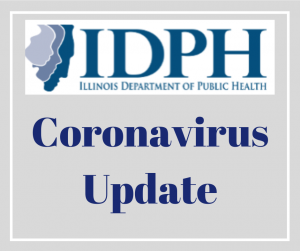Number of coronavirus cases grows in Illinois; Pritzker criticizes feds response
By Ben Orner Capitol News Illinois and Chronicle Media — March 13, 2020 The Illinois Department of Public Health on Wednesday (March 11) announced six additional individuals have tested positive at the IDPH laboratory for coronavirus disease (COVID-19).
The Illinois Department of Public Health on Wednesday (March 11) announced six additional individuals have tested positive at the IDPH laboratory for coronavirus disease (COVID-19).
Total number of cases reported now is at 32
“More cases in more places in Illinois means we are seeing growing transmission of the virus in the community,” said IDPH Director Dr. Ngozi Ezike. “Today the World Health Organization characterized COVID-19 as a pandemic. We will see additional cases in Illinois, and I urge people to take steps now to reduce the impact this will have on their daily lives.”
Public health officials are still investigating the travel history of the new cases and any potential contact with a known COVID-19 case. Public health officials will identify and contact people who are considered close contacts of the cases.
Ezike announced seven new cases Thursday, March 12: a woman in her 40s and a male youth in Chicago; a Kane County resident in his 70s; two Cook County women in their 70s and a Cook County man in his 50s; and a McHenry County man in his 60s.
About a quarter of those cases are believed to be from “community spread,” which means the infected persons have neither a travel history to an affected area nor a connection with other known cases. There have been no known deaths from the virus in Illinois.
“We want everyone to start thinking and preparing now for the virus to circulate more widely in the community,” said Dr. Ngozi Ezike, director of the Illinois Department of Public Health. “Social distancing will be important to slow and reduce and dampen the effect in our community. This may include canceling large events.”
Gov. J.B. Pritzker said “several” have since recovered and returned to normal life. Ezike said all current patients are “stable.”
Officials also updated the most vulnerable populations, the elderly and people with underlying medical conditions, on how they can best guard against the virus.
“We are asking our older adults to limit their activities in the community, especially large indoor events,” Ezike said. “We are also recommending long-term care facilities and nursing homes to restrict visitors under the age of 18 and those with obvious colds, influenza or potential COVID-19 infection.”
Chicago Public Health Commissioner Dr. Allison Arwady advised people over the age of 60 or with underlying conditions to not attend large gatherings and encouraged people with underlying conditions to stock up on medications.
“As we potentially see additional spread of this disease, we don’t want people coming into the medical system who don’t need to be there,” she said.
Pritzker said he is working with county election boards on possibly moving polling places out of nursing homes. On Monday he announced the Quincy Veterans Home would move its polling location for the March 17 primary election. He also said it is possible the deadline to obtain an absentee ballot could be extended.
Pritzker slams federal response
“I am very frustrated with the federal government,” the governor said, as U.S. cases of the virus surpassed 800 on Tuesday. “We have not received enough tests.”
Pritzker said the state would like to be able to test any person who shows symptoms or just wants to be tested, but said federal officials have not kept their word.
“We’ve been told now for days and days and days — indeed weeks, I would argue — that there are commercial labs that would be coming online,” he said. “I was just told today commercial labs would be coming online within days. Once again, I’ve been told the same thing again. We haven’t seen it.”
The only places able to test for COVID-19 right now are the three state-run labs in Chicago, Springfield and Carbondale.
Pritzker also criticized the Trump administration’s decision to forgo the World Health Organization’s COVID-19 test, which has been used on hundreds of thousands of people in Europe and Asia, in favor of its own test.
“We could have been using that weeks ago here in the United States,” he said. “It’s been too long already.”
AG warns of scams
Illinois Attorney General Kwame Raoul is urging people to not fall victim to email and social media scams related to the virus.
“According to the CDC, there is currently no known treatment for COVID-19. People should be aware that any email or website offering a ‘cure’ is a scam that should be avoided,” Raoul said Tuesday in a news release.
He says products such as chlorine dioxide, hydroxychloroquine, essential oils, silver, elderberry and garlic are being falsely advertised as treatments and cures for the virus.
Raoul also encouraged Illinoisans to be cautious when donating to coronavirus-related charitable causes, since fundraisers and charities are required to register with the AG’s office.
Among his tips to prevent getting scammed include not donating if the solicitor uses high-pressure tactics or asks for cash; confirming the charity exists when you receive an email or text asking for a donation; and being wary of “look-alike” websites.
Virus prevention tips
Officials have said the best ways to avoid contracting COVID-19 include covering your coughs and sneezes, washing your hands for 20 seconds with soap and water, avoiding touching your face, staying home when you are sick and cleaning frequently touched surfaces.
Illinoisans who think they might have the virus may call the state’s COVID-19 hotline (1-800-889-3931) or email dph.sick@illinois.gov. IDPH also has a webpage of frequently asked questions: http://www.dph.illinois.gov/topics-services/diseases-and-conditions/diseases-a-z-list/coronavirus.
- For information about how you, your school, your workplace, and your community can prepare, visit Preventing COVID-19 Spread in Communities at www.cdc.gov/coronavirus/2019ncov/community/index.html.For general questions about COVID-19, call 1-800-889-3931 or email dph.sick@illinois.gov.Information and updates on COVID-19 can be found on the Illinois Department of Public Health website, www.dph.illinois.gov/topics-services/diseases-and-conditions/diseases-a-z-list/coronavirus; the CDPH website, www.chicago.gov/city/en/depts/cdph/provdrs/health_protection_and_response/svcs/2019-novel-coronavirus–2019-ncov-.htmland the CDC website, www.cdc.gov/coronavirus/2019-ncov/about/index.html.borner@capitolnewsillinois.com









